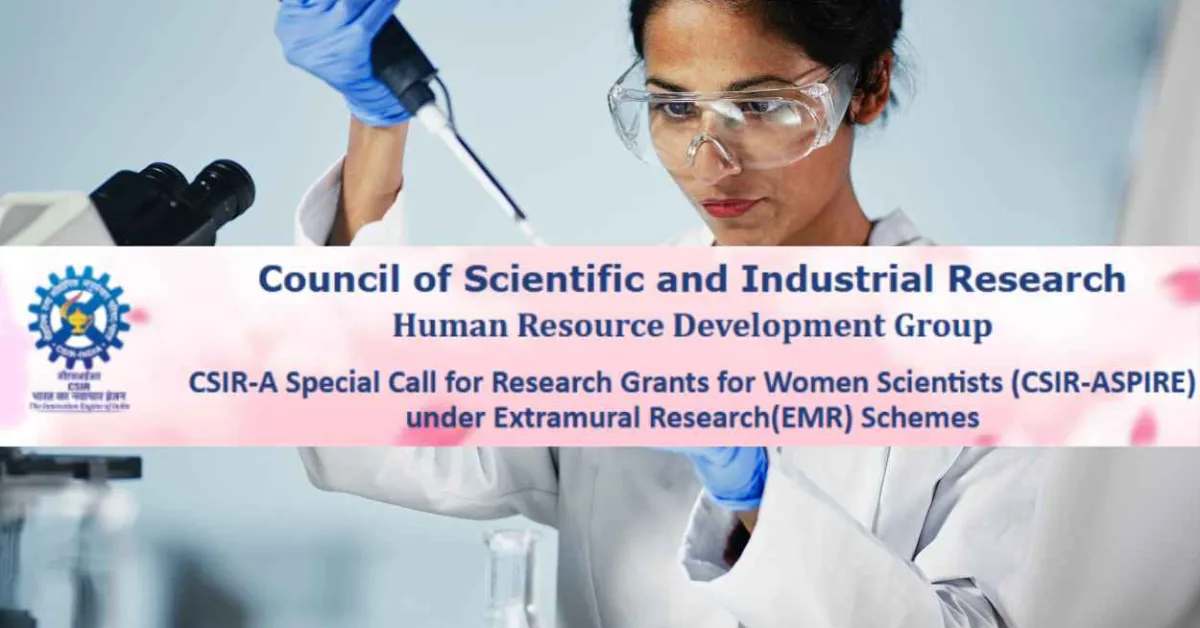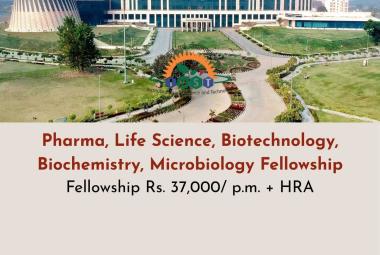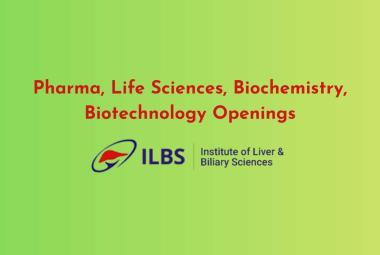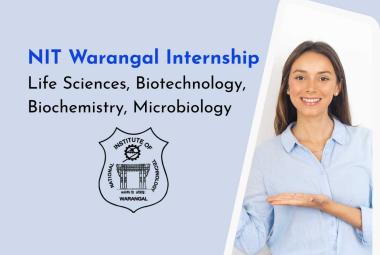CSIR - A Special Call for Research Grants for Women Scientists (CSIR-ASPIRE)
Aligned to the Government of India’s initiative to empower women and promote ‘Nari Shakti’ in the country and Hon’ble Prime Minister’s efforts to put Nari Shakti at the forefront of India’s development journey, as we move towards Amrit Kal, CSIR has for the first time announced A Special Call for Research Grants for Women Scientists (CSIR-ASPIRE). In this call only women scientists across the country are eligible to apply for research grants to carry out R&D in major disciplines of science and engineering viz Life Sciences, Chemical Sciences, Physical Sciences, Engineering Sciences and inter/trans disciplinary sciences. The funds will be provided for staff (JRF/SRF/RA), contingency and minor equipment. The total budget of a research proposal including research fellow’s stipend should generally not exceed the limit of 25-30 lacs.
The Council of Scientific & Industrial Research (CSIR) provides financial assistance to promote research work in the fields of Science & Technology, including Agriculture, Engineering and Medicine. The assistance is provided by way of grants to Professors/Experts in regular employment, in the universities, IITs, post-graduate institutions, recognised R&D laboratories both in public and private sectors. Research proposals of applied nature as well as those falling under basic sciences which attempt to solve specific problems being pursued by CSIR laboratories, or in newer and complementary fields, are considered for CSIR support. Priority is given to multi-disciplinary projects which involve inter-organisational co-operation (including that of CSIR laboratories) and to schemes which have relevance to research programmes of CSIR laboratories.
Appointment of JRF/SRF/RA :
The approved research schemes of CSIR have provision for manpower to assist the investigator(s) in the research programmes. The positions provided are JRF, SRF and/or RA. The qualifications and age requirements for JRF/SRF/RA appointments are given in paras respectively.
JRFs : Competitive written test is conducted jointly by CSIR and UGC at national level (National Eligibility Test, NET), to qualify young men and women for appointment as JRFs. Available NET qualified candidates under i) JRF and ii) Lecturership (NET) categories can be appointed directly in the schemes of CSIR. Persons who have qualified in the GATE test can also be selected for appointment as JRFs. Both NET and/or GATE candidate should be interviewed to determine their suitability. Selection is to be done as per the procedure (iii) Non-NET or non-GATE qualified candidates cannot be appointed as JRFs.
SRFs
(i) CSIR directly selects a certain number of persons for SRFs on the basis of academic record, published work and interview by discipline-wise high-level expert committees. Persons among these awardees, who are otherwise eligible, can be appointed as SRFs in CSIR schemes.
(ii) The NET/GATE qualified candidates having a minimum of 2 years of research experience after MSc or equivalent degree can be selected and appointed on the basis of their possessing two years training in methods of research and aptitude for research. The details of the selected candidates accompanied by NET/GATE qualification certificates and recommendations of the interview boards constituted for the purpose of recruiting SRF(s) must be sent to CSIR. The appointments will be then formally approved by CSIR. National advertisement may not be necessary here.
(iii) SRFs can also be selected by national advertisement or through wide circulation of the advertisement material from among the non-NET/GATE qualified MSc /equivalent degree candidates possessing two years training in methods of research and aptitude for research assessed from published project work or candidates possessing ME/MBBS or equivalent qualifications. The eligible candidates will be interviewed by a Board consisting of the PI, Head of the Department and an external member from outside the university/institution who is an expert in the relevant field and is not below the rank of Professor/Associate Professor. Where PI is the Head of the Department, the Dean of the university/institution may be associated with the Board. The recommendations of the Board on each applicant, alongwith all the candidates' applications are to be sent to CSIR for the approval and formalization of selection.
RAs
(i) Persons among those directly selected by CSIR for award of RA-ship can be appointed as RAs in schemes.
(ii) The procedure given in 3.5.2 can be used for appointing RAs. However, CSIR is to be informed about the outcome of selection, so that the same can be formalized.
• When JRF/SRF/RA is selected by modes 3.5.2 and 3.5.3, the biodata of the candidates should be obtained in form-G. The following documents are to be sent CSIR-HRDG for the approval of staff. (i) Copy of advertisement. (ii) Copy of minutes of the selection committee (iii) Form-G duly filled in by the candidate and signed and sealed by PI and the head of the institution. (iv) Copy of candidates’ educational testimonials from class 10th onwards duly certified (v) Proof of date of birth (vi) Proof of experience(if any) (vii) Copy of caste certificate or handicapped certificate as the case may be.
• PI may appoint JRF/SRF/RA in place of sanctioned position under intimation to CSIR indicating reasons thereof.
• The tenure of the fellow(s)/associate(s) appointed in a scheme, excepting that of JRF-NET (CSIR), is co-terminus with the scheme. In other words, the tenure of the Fellow/Associate shall cease from the date the scheme terminates, irrespective of the period of fellowship/associateship held by him/her in that scheme. The total tenure of a fellow as JRF+SRF can be 5 years only. The normal tenure of RA will be 3 years. However, when an RA is appointed before completion of a total tenure of 3 years, he/she may be allowed to continue till the tenure of the scheme. However specific approval of CSIR(HRDG) may be obtained in such cases.
The educational qualifications prescribed for the award of research fellowship/associateship are as under :-
JUNIOR RESEARCH FELLOWSHIP (JRF-ship)
The minimum qualifications are BS 4 years programme / BPharm / MBBS / Integrated BS-MS / MSc / BE / BTech or equivalent degree, with 55% marks and passing of NET/GATE test. The selection for award of JRF is made on the basis of a competitive written test organised jointly by CSIR and UGC at National Level. Twice a year in the following areas 1) Chemical Sciences, 2) Earth, Atmosphere, Ocean and Planetary Sciences, 3) Life Sciences, 4) Mathematical Sciences 5) Physical Sciences and 6) Engineering Sciences. There is a single MCQ (Multiple Choice Questions) paper based on test comprising of three parts A) is common to all subjects comprising questions of general science and research aptitude. Part B) contains subject related conventional MCQ and Part C) contains higher value questions that may test the candidates knowledge of the scientific concepts and/or application of the scientific concepts.
Online applications for JRF-NET are invited twice a year on all India basis through press advertisement. The information with respect to the inviting applications is also available on HRDG website ( csirhrdg.res.in)
SENIOR RESEARCH FELLOWSHIP (SRF-ship)
The minimum qualifications (Under Research Scheme only) are:
(i) MSc,BE, BTech, BVSc, BPharm, or equivalent degree, and at least two years of post-MSc, BE, BTech, BVSc, BPharm, research experience, as evidenced from published papers in standard refereed journals;
(ii) ME,MTech or equivalent degree in Engineering/Technology;
(iii) MBBS or BDS, with 1 year internship/MVSc/ MPharm or equivalent.
RESEARCH ASSOCIATESHIP (RA-ship)
The minimum qualifications are : Doctorate (PhD/MD/MS/MDS) or equivalent degree OR having 3 years of research, teaching and design and development experience after MVSc/MPharm/ME/MTech.
The upper age limit for JRF, SRF and RA shall be 28, 32 and 35 years respectively as on the day on which the application is made. A small relaxation in age limit may be considered, in the case of applicants who are suitably qualified and experienced, on the recommendations of the selection committee. The upper age limit is relaxable upto 5 years in the case of candidates belonging to scheduled castes/tribes/OBC, women and physically handicapped candidates.
Stipend :
The stipend payable to JRF, SRF & RA working in the research schemes is as
JRF : 1st & 2nd Year Rs. 31000/- ; 3rd & Subsequent Year Rs. 35000/-
SRF : 1st & 2nd Year Rs. 35000/- ; 3rd & Subsequent Year Rs. 35000/-
SRF : The consolidated emoluments will be under the following 3 slabs depending on qualification and experience: a) Rs.47,000/- b) Rs.49,000/- c) Rs.54,000/
1. Assessment for continuance : Progress of JRF and SRF working in a research scheme will be assessed at the end of two years by a Committee consisting of the PI, the Head of the Department (where the PI himself happens to be the Head of Department, the second member of the Committee will be the Dean or Professor/Associate Professor/Reader of the Department) and an external member from outside the university/institution who is an expert in the relevant field and is not below the rank of Professor/Associate Professor. The stipend of JRF will be increased from Rs 31000/- pm to Rs 35000/-pm and of SRF for the remaining tenure of the scheme, provided the research progress has been found satisfactory by the Committee. On upgradation, the designation of JRF will be changed to SRF.
2. House rent allowance (HRA) and Medical allowance (MA): In addition to stipend, the fellow/associate will be entitled to: (i) HRA, as per rules of the Host Institution, provided he/she has not been given hostel accommodation (stipend paid/payable will be treated as pay for the purpose of HRA), (ii) MA, as admissible as per the rules of the Host Institution to its employees (this will be limited to the fellow only and not for family members/dependents).
3. Leave : A Fellow/Associate may avail of 45 days leave with stipend for each completed year of his tenure or on pro-rata basis for any fraction of a year. The leave due can be carried over to the next year. However, not more than 90 days leave can be accumulated at any time during the tenure of fellowship/associateship and not more than 30 days can be availed of at the end, i.e. prior to the completion of the tenure.
The PI may grant leave to a Fellow/Associate with the concurrence of the Head of the Department/Institution, if the leave with stipend is due, as mentioned in the para 3.13. If leave with stipend is not due, such cases will be decided by CSIR only, and the Fellow/Associate should not be allowed to proceed on leave without prior approval of the Council.
(i) For women Fellows/Associates with less than 2 surviving children, full stipend plus usual HRA per month may be paid during the period of absence upto 180 days on grounds of maternity. Leave may be sanctioned by the PI under intimation to CSIR. The Fellowship/ Associateship amount for such leave period will be payable after the Fellow/Associate resumes duty and submits a medical certificate in support of actual confinement.
Male fellows/Associates of CSIR with less than 2 surviving children are entitled for 15 days paternity leave during confinement of his wife on submission of relevant documentary proof.
The following are the general rules governing the fellowship/associateship :
(i) Only Indian citizens are eligible for research fellowship/associateship.
(ii) The award of fellowship/associateship does not imply any assurance or guarantee for subsequent employment by CSIR or at the Institution where he/she is working.
(iii) If a Fellow/Associate is reported to have been lacking in his or her research assignment, the fellowship/associateship is liable to be terminated by CSIR.
General
1. The Council of Scientific & Industrial Research (CSIR) provides financial assistance to promote research work in the fields of Science & Technology, including Agriculture, Engineering and Medicine. The assistance is provided by way of grants to Professors/Experts in regular employment, in the universities, IITs, post-graduate institutions, recognised R&D laboratories both in public and private sectors. Research proposals of applied nature as well as those falling under basic sciences which attempt to solve specific problems being pursued by CSIR laboratories, or in newer and complementary fields, are considered for CSIR support. Priority is given to multi-disciplinary projects which involve inter-organisational co-operation (including that of CSIR laboratories) and to schemes which have relevance to research programmes of CSIR laboratories(Annexure-IV).
2. A time bound research proposal clear and specific in the objective(s) making use of or proposing a new idea and realistic and reasonable in the means needed to execute it has a good chance of receiving CSIR support. The CSIR provides essential financial inputs for viable research schemes so as to obtain definite advancements in specific fields and areas.
3. Research grants of CSIR are intended mainly to supplement the research facilities available with the sponsoring institutions. Funds provided are for one or more Junior Research Fellows (JRF), Senior Research Fellows (SRF) and Research Associates (RA), contingencies and equipment. Usually the amounts sanctioned for equipment are small. No graded posts are sanctioned nor are funds provided for other kinds of expenditure.
EMR schemes are not intended to support establishment (de novo) of specialized facilities, centres or divisions. These schemes are intended to supplement on-going R&D efforts in institutions/laboratories/departments, etc. where basic infrastructure exists.
4. Depending on the magnitude and nature of research involved a research scheme may have more than one investigator and, in such a case, the first investigator shall be known as "Principal Investigator" (PI). In the event of a collaborative project involving two or more institutions, the consent of each such institution must be furnished with the proposal. Collaborative projects involving CSIR laboratories are encouraged.
5. The PIs may submit their proposals directly to the Head, Human Resource Development Group (HRDG) of CSIR.
6. CSIR has discipline-wise research committees to consider the research proposals falling in their respective fields and make recommendations to the Competent Authority of CSIR for financial assistance. The research committees usually meet twice a year and recommend grants for viable research schemes received for financial assistance and review the progress of ongoing schemes for their continuation.
7. The Directors of CSIR laboratories may invite applications for research grants in specific areas of interest to their respective laboratories. They will forward these to the CSIR HRD Group.
8. Schemes in which collaboration has been indicated between industries and CSIR laboratories or between universities and CSIR laboratories or among industries, universities and CSIR laboratories, will receive support on priority basis on the approval of DGSIR.
9. Sanctioned schemes are monitored and renewed each year by research committees based on the progress reports to be submitted by the investigators. These should be received by CSIR by Ist October every year. The PI may also be required to present the progress of research work before the Research Committee for midterm correction and appraisal. PI is expected to suitably acknowledge the support received from CSIR in each of the publications arising from the work done under the scheme. Schemes are liable to be terminated if the progress is not considered satisfactory by the concerned committee. On completion of the scheme, the PI is required to submit a Final Technical Report (FTR) in the prescribed proforma (Form-F).
Operation of a Sanctioned Scheme
1. Documents to be sent to CSIR: CSIR funds are placed at the disposal and control of the sponsoring institution which is entrusted with the accountability of grant. The quantum of financial assistance to each sanctioned scheme is mentioned in the original award letter and renewal sanction. Grants are released in one or two installments for each fiscal year. The grant of the first installment will be sent through RBI-EFT (electronic fund transfer), to the concerned authority of the institution on the receipt of EFT transaction request form (Form-K). It is stipulated that the scheme shall start from the commencement date mentioned in the letter or within 3 months from the date of issue of the letter. The contingent and staff grants are on pro-rata basis and will be admissible from the date of start of the scheme (3.2). The excess/unutilised amounts of grants will be adjusted in the subsequent year's claim bill. The contingent and staff grants are not carried forward to the next financial year. Following documents need to be provided to CSIR immediately after the receipt of sanction letter: (i) a certificate by the PI countersigned by the Head of the department/institution that no other aid-giving agency is funding the work proposed to be done under the scheme sanctioned by CSIR, and (ii) an agreement in the prescribed Form-A on non-judicial stamp paper of Rs 10/- (each page duly signed by PI) and (iii) date of commencement (iv) RBI-EFT form (Form-K).
2. Date of start: A scheme is considered to have commenced as soon as some expenditure has been incurred out of the grant/date of joining of fellow.
3. Purchase of equipment: For the release of equipment grant the proforma invoice of the supplier, with whom the order has been placed is to be furnished by PI along with the claim bill to CSIR through the Registrar/Principal/Director of the Institute upon completion of purchase formalities, in any case within 3 months from the date of receipt of the equipment grant.
4. Tenure: The tenure of a scheme is 3 years or less as asked for by the investigator. Extension beyond 3 years may be considered in a few deserving cases depending on the progress and need of the project; extension is granted rarely. The period of extension will be limited to a maximum of two years. The PI may make a request for extension in time, preferably in his renewal application for third year, giving detailed justification and period for which extension is required. A detailed report of scientific achievements under the scheme since its inception must invariably be sent alongwith the request for extension. The PI should also state clearly that a second extension is not contemplated at all.
Procedure for Applying
1. Applications for research grants can be submitted at any time during the year. The research proposal should be submitted in the prescribed proformae (Form-C & Form-C1). The application should be forwarded, through the Head of the concerned institution duly certified that (i) the core facilities are available and will be provided to the investigator(s) to work on the proposed scheme, and (ii) the department/institute will discharge all its obligations, particularly in respect of management of the grants given. Ethical clearance where required should be enclosed with Form C. If equipment is to be purchased, quotations for the same must be enclosed with Form C. PIs from private institutes are required to send relevant documents regarding the status of their institute. Recognition certificate from UGC/DST/DSIR or affiliation certificate stating that the affiliation of institute to the recognized university/institutes for at least next three years. In case of colleges, PG course in the proposed area of research should be operational at the time of submission of the project.
2. The research proposals on receipt in CSIR are sent to referees (from a panel drawn by Human Resource Development Group HRDG, CSIR and CSIR laboratories in which work related/analogous to the proposal is in progress, for their evaluation. These are then considered by the concerned area research committees.
Registration Process :
The Principal Investigator (PI) has to register by providing the required details. On successful registration, the user will receive a One Time Password setting mail to his/her registered email, using the link therein the user can create/set password for her account on the portal.
General Instructions :
• Under the CSIR-ASPIRE scheme, Principal investigator of a research proposal has to be a woman scientist in regular employment.
• At the time of submission the Principal investigator (PI) must have sufficient number of years in service to complete the normal tenure of research proposal.
• The normal tenure of research proposal may be two or three years.
• The Principial investigator already having an ongoing CSIR project with more than a year’s tenure left, may not apply under the scheme this time and may wait for the next call.
Last Date for submission of Proposal : 30-Apr-2023
See All Telangana Alerts B.Pharm Alerts M.Pharm Alerts M.Sc Alerts
See All Other Jobs in our Database









